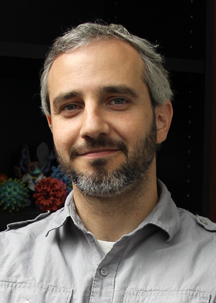Of Note
New Grant to Support Faster Imaging of Cellular Machinery
Scientists at The Scripps Research Institute (TSRI) have been awarded more than $500,000 from the National Institutes of Health (NIH) to upgrade computing and storage facilities in the institute’s cryo-electron microscopy (cryoEM) laboratories.
The new grant will make it possible for the researchers to keep up with the growing amounts of data collected on the institute’s cutting-edge cryo-EM equipment. With this data, researchers can construct 3D models of cell structures to better understand diseases such as AIDS, Alzheimer’s and Ebola.
“TSRI has a world-class cryoEM facility with more high-resolution microscopes and direct electron detectors than any other site in the country,” said TSRI biologist Gabriel Lander, who will lead the new project. “This new computing equipment will enable us to dramatically increase the rate at which we are able to solve the structures of biomedically relevant macromolecules.”
More than 40 other laboratories at TSRI collaborate with the cryoEM laboratories. Lander estimates that the new equipment will reduce their data processing time from two months to just a week or less, opening up the possibility for expanded sample testing and more pilot studies.
Stephanie Sillivan Receives Pathway to Independence Award
Stephanie Sillivan, research associate in the Miller lab at Scripps Florida, has received a Pathway to Independence Award (K99/R00) from the National Institutes of Health’s National Institute on Drug Abuse. The award provides five years of support to facilitate a postdoctoral fellow’s timely transition from a mentored research position to independent research.
Sillivan’s research, titled “MicroRNA-mediated mechanisms of heroin drug seeking,” aims to identify miRNA-mediated mechanisms that sustain heroin seeking after prolonged abstinence, leading to new targets for novel therapies to prevent relapse to opioid use.
Richard Brust Wins NIH Fellowship
Richard Brust, research associate in the Kojetin lab at Scripps Florida, has won a Ruth L. Kirschstein Postdoctoral Individual National Research Service Award from the National Institutes of Health, supporting promising postdoctoral candidates who have the potential to become productive, independent investigators in scientific health-related research fields.
Brust’s research, titled “Structural analysis of corepressor binding to PPARgamma,” seeks to characterize the corepressor binding site of PPARgamma, which will lead to an improved mechanistic understanding of this type 2 diabetes drug target.
William Guerrant Wins ACS Fellowship
William Guerrant, postdoctoral fellow in the Kissil lab at Scripps Florida, has won an American Cancer Society fellowship, which provides initial funding leading to an independent career in cancer research.
Guerrant’s project, “Hippo-YAP Inhibition as a Therapeutic Strategy for Neurofibromatosis Type 2,” focuses on identifying chemical inhibitors of the signaling pathways that promote neurofibromatosis type 2, an inherited genetic disorder characterized by growth of nervous system tumors, which currently has no cure and limited treatment options of symptoms.
Send comments to: mikaono[at]scripps.edu














